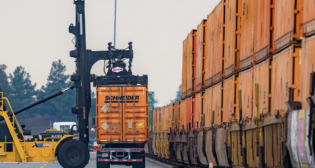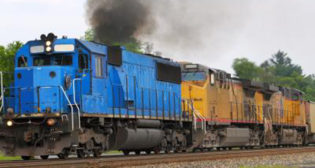
UPDATE: Short line tax credit; STB’s new members
Written by Frank N. Wilner, Capitol Hill Contributing EditorRestoration of the 50% investment tax credit for short line railroads—commonly known as 45-G for its designated section in the Internal Revenue Code—again appears a reality in Congress after that “wall thing” debate interfered with the tax credit’s passage just prior to final adjournment of the 115th Congress.
Crucially, the newly introduced House and Senate bills in the 116th Congress apply the investment tax credit retroactively to 2018—as the previous successful extension expired at the end of 2017—and make the 45-G credit permanent so as to avoid periodic renewal in the future.
Meanwhile, the end of the 35-day partial government shutdown allows the Surface Transportation Board (STB) to reopen this week, with two new members—Republican Patrick J. Fuchs and Democrat Martin J. Oberman—joining Chairman Ann Begeman, a Republican.
Democrat Deb Miller departed Dec. 31 at the end of her statutory holdover year following expiration of her first term. Although renomination to a second term had been expected, it didn’t occur in 2018 during the 115th Congress, and has yet to occur since the start of the 116th. Speculation now is that she will withdraw her name and return to her Kansas home if not renominated soon.
Republican Michelle A. Schultz, whose 2018 White House nomination was not acted upon by the Senate during the 115th Congress, causing the nomination to be returned to the President, was nominated again earlier this month. She awaits a Senate Commerce Committee hearing prior to a Senate confirmation vote.
The five-member authorized STB now has a 2-1 Republican majority, with two vacant seats. Anticipated is that Schultz’ confirmation vote will be delayed until President Trump nominates a Democrat to be paired with Schultz for confirmation.
The 35-day partial government shutdown obviously created a significant delay in STB decision-making, although there are no deadline-sensitive major rate cases or merger applications pending, and the STB tolled the clock for the duration of other cases where decision-making has time deadlines. Most-watched at the STB are several non-time deadline rulemakings of substantial importance to shippers—some dating back years—although railroads are quite content that they lay fallow. The government shutdown will further slow their progress.
As for the 50% investment tax credit, bills have been introduced in the House and Senate to restore it and make it permanent, as opposed to the six renewals it has required since established in 2005.
In the House, H.R. 510 (currently awaiting a formal name) was introduced Jan. 11 by Earl Blumenauer (D-Ore.) and Mike Kelly (R-Pa.), and referred to the Ways and Means Committee, where all tax-related legislation must originate. It quickly gained a total of 45 Democratic and Republican co-sponsors in the 435-member chamber. Among the co-sponsors is Peter A. DeFazio (D-Ore.), the new chairman of the Transportation & Infrastructure Committee; and Sam Graves of Missouri, the committee’s senior Republican.
In the Senate, S. 203, the Building Rail Access for Customers and the Economy (BRACE) Act, was introduced by Mike Crapo (R-Idaho) and referred to the Finance Committee. It has 11 co-sponsors, including six Republicans. Two of them are former Commerce Committee Chairman John Thune (R-S.Dak.), who now is the Senate Republican Whip, the second highest Senate post; and Thune’s successor as Commerce Committee Chairman, Roger F. Wicker (R-Miss.). Among Democratic co-sponsors is Senate Minority Leader Charles E. (Chuck) Schumer (D-N.Y.).
Near identical House and Senate bills that failed to be enacted during the 115th Congress attracted broad bi-partisan support, picking up 262 House co-sponsors and 56 Senate co-sponsors.
The American Short Line and Regional Railroad Association (ASLRRA) is anxious that the investment tax credit is enacted into law prior to tax filings in April. Although the bills, as introduced, are unlikely to move to the House and Senate floors on their own, the provisions are expected to be incorporated into other tax-related bills to ensure an express track to passage.
ASLRRA says its members invest “a significant portion of their revenue in track and bridge maintenance and improvements.” Since 2005, short line railroads have invested more than $4 billion in their privately owned infrastructure, much of which serves some 10,000 rail shippers in rural areas nationwide.
“Short line railroads provide the first and last mile service to one in five cars moving on the nation’s freight rail system, allowing shippers competitive transportation access to the U.S. and world economies,” says ASLRRA.
ASLRRA says the investment tax credit has support of the American Association of State Highway and Transportation Officials, the American Association of Port Authorities, and the American Farm Bureau Federation.



